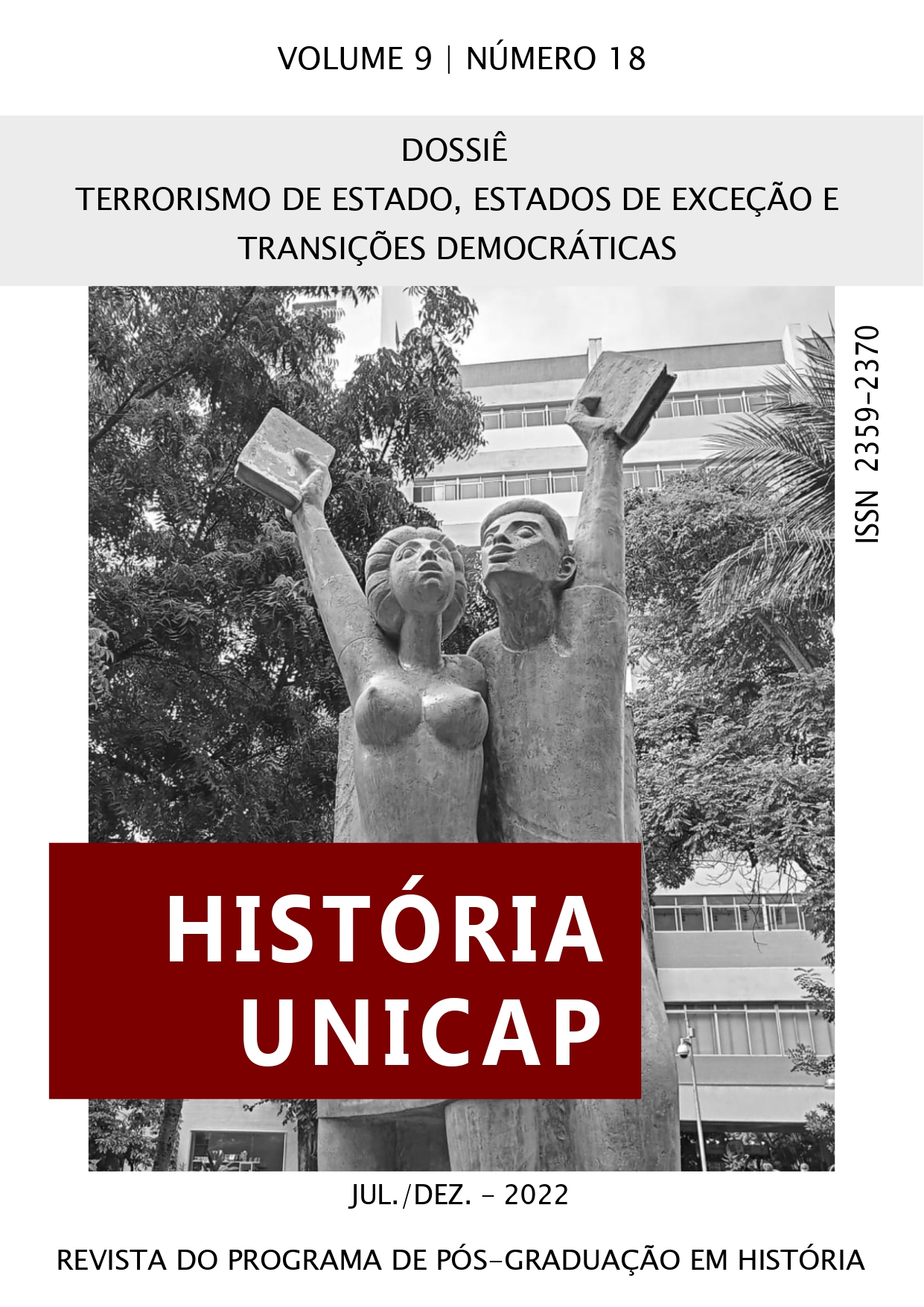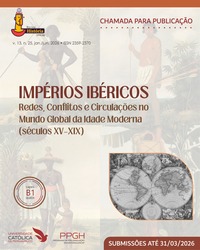Rebel Military Justice as a Diffusing Element of Responsibilities During the Spanish Civil War (1936–1939)
DOI:
https://doi.org/10.25247/hu.2022.v9n18.p69-87Keywords:
Collective Responsibility; Military Justice; Spanish Civil WarAbstract
As the latest research on the topic has pointed out, the brutal violence that followed the coup d'état of 1936 was not exercised by a large number of perpetrators. However, they managed to make the feeling of guilt emanating from the process perceived as a feeling to be shared by broad social groups. This paradox has had severe repercussions after the fall of the dictatorship, the most obvious being the lack of any transitional justice. This article will analyze eliminationist violence as an element of union that creates collective guilt and acts as a new pillar of Franco's political power. We will delve into the universe of terror by elaborating a prosopography of the elements that form it, explaining how they articulate it and relate to each other. To this end, we will focus on the functioning of the military judicial system, both in its role as a critical piece within the genocidal logic and in its facet of interpreting a legal dramaturgy that pursues specific interests. The military plaza of Pontevedra (Galicia) will be our case study, showing on the one hand how the lack of a war front did not imply the absence of violence and, on the other, how the rearguard acted as a laboratory for testing eliminationist practices that would later be exported to different territories of Spain as the war progresses.
Downloads
References
ANDERSON, Peter. The Francoist Military Trials. Terror and Complicity, 1936–1945. Londres – Nueva York: Routledge, 2010.
ARENDT, Hannah. Eichmann en Jerusalén. Barcelona: Penguin Random House, 2015 [1963].
ARENDT, Hannah. The Origins of Totalitarianism. Nueva York: Houghton Mifflin Harcourt Publishing Company, 1973 [1951].
CABANA, Ana. Passive Resistance. Notes for a More Complete Understanding of the Resistance Practices of the Rural Population During the Franco Dictatorship. Amnis, 30/01, 2010.
CENARRO, Ángela. Matar, vigilar y delatar: la quiebra de la sociedad civil durante la guerra y la posguerra en España (1936 - 1948). Historia Social, v. 44, 2002
CIDRÁS, Aldara. Las violencias contra las mujeres en la guerra civil española según sus supervivientes. La provincia de Pontevedra (1936 - 1939). In: CAÑÓN, Lisandro (org.). Investigaciones sobre terrorismo de estado y estados de excepción. Buenos Aires: Lago Editora, 2021, p. 177–208.
DEL ARCO BLANCO, Miguel Ángel; HERNÁNDEZ, Claudio; et al. (eds.). No sólo miedo. Actitudes políticas y opinión popular bajo la dictadura franquista (1936 - 1977), Granada: Comares, 2013.
FERNÁNDEZ PRIETO, Lourenzo; MÍGUEZ MACHO, Antonio (eds.). Golpistas e verdugos de 1936. Historia dun pasado incómodo. Vigo: Galaxia, 2018.
FERNÁNDEZ-CREHUET LÓPEZ, Federico. Jueces bajo el franquismo. Once historias (y una nota sobre la depuración de los funcionarios judiciales). Granada: Comares, 2011.
FITZPATRICK, Sheila; GELLATELY, Robert. Accusatory Practices. Denunciation in Modern European History, 1789 – 1989. Chicago: University of Chicago Press, 1996.
FOUCAULT, Michel. Discipline and Punish. The Birth of Prison. Londres: Penguin Books, 1977 [1975].
GRANDÍO, Emilio (ed.). Vixiados. Represión, investigación e vixilancia na Galiza da Guerra Civil (1936 - 1939). Santiago de Compostela: Laiovento, 2011.
JOLY, Maud. Las violencias sexuadas de la Guerra Civil Española: paradigma para una lectura cultural del conflicto. Historia Social, v. 61, 2008, p. 89–107.
LANERO TÁBOAS, Mónica. Una milicia de la justicia. La política judicial del franquismo (1936–1939). Madrid: Centro de Estudios Constitucionales, 1996.
LEVI, Primo. Si esto es un hombre. Barcelona: Austral, 2018 [1958].
MÍGUEZ MACHO, Antonio. La genealogía genocida del franquismo. Violencia, memoria e impunidad. Madrid: Abada, 2014.
MÍGUEZ MACHO, Antonio. Las milicias ciudadanas en Galicia durante la Guerra Civil (1936–1939). In: ORTEGA LÓPEZ, María Teresa; DEL ARCO BLANCO, Miguel Ángel (coords.): Claves del mundo contemporáneo: debate e investigación. Actas del XI de la Asociación de Historia Contemporánea. Granada: Comares, 2013.
MIR, Conxita. Vivir es sobrevivir. Justicia orden y marginación en la Cataluña rural de posguerra, Lleida: Milenio, 2000.
MORADIELLOS, Enrique. Historia mínima de la Guerra Civil española. Madrid: Turner, 2016.
PAYNE, Stanley. El régimen de Franco, 1936–1975. Madrid: Alianza, 1987.
PINO ABAD, Miguel. Los albores de la suprema jurisdicción castrense franquista. Anuario de Historia del Derecho Español, v. 84, 2014, pp. 365–387.
PRESTON, Paul. The Spanish Holocaust: Inquisition and Extermination in Twentieth Century Spain. Nueva York: W. W. Norton Company, 2011.
RUEDA LAFFOND, José Carlos. Reconciliación nacional. In: FUENTES, Juan Francisco; RUEDA LAFFOND, José Carlos (dirs.). Diccionario de símbolos políticos y sociales del siglo XX español. Madrid: Alianza, 2021, p. 553–558.
SÁNCHEZ RECIO, Glicerio. El estigma republicano de la magistratura. La depuración franquista de los jueces. Alicante: Publicacions de la Universitat d’Alacant, 2020.
VÁZQUEZ OSUNA, Federico. La rebel·lió de “sus señorías”. L’administració de justícia a Catalunya (1931–1945). Barcelona, Tese (Doutorado), Universitat de Barcelona, 1999.
Downloads
Published
Issue
Section
License
Copyright (c) 2022 HISTÓRIA UNICAP

This work is licensed under a Creative Commons Attribution 4.0 International License.
Concedo a Revista História Unicap o direito de primeira publicação da versão revisada do meu artigo, licenciado sob a Licença Creative Commons Attribution (que permite o compartilhamento do trabalho com reconhecimento da autoria e publicação inicial nesta revista).
Afirmo ainda que meu artigo não está sendo submetido a outra publicação e não foi publicado na íntegra em outro periódico e assumo total responsabilidade por sua originalidade, podendo incidir sobre mim eventuais encargos decorrentes de reivindicação, por parte de terceiros, em relação à autoria do mesmo.
Também aceito submeter o trabalho às normas de publicação da Revista História Unicap acima explicitadas.
















 A História Unicap está licenciada com uma licença
A História Unicap está licenciada com uma licença 